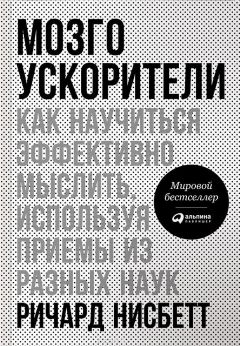49
Masuda, Takahiko, P. C. Ellsworth, B. Mesquita, J. Leu, and E. van de Veerdonk. “Placing the Face in Context: Cultural Differences in the Perception of Facial Emotion.” Journal of Personality and Social Psychology 94 (2008): 365-81.
Masuda, Takahiko, and Richard E. Nisbett. “Attending Holistically Vs. Analytically: Comparing the Context Sensitivity of Japanese and Americans.” Journal of Personality and Social Psychology 81 (2001): 922-34.
Cha, J.-H., and K. D. Nam. “A Test of Kelley’s Cube Theory of Attribution: A Cross-Cultural Replication of McArthur’s Study.” Korean Social Science Journal 12 (1985): 151-80.
Choi, Incheol, and Richard E. Nisbett. “Situational Salience and Cultural Differences in the Correspondence Bias and in the Actor-Observer Bias.” Personality and Social Psychology Bulletin 24 (1998): 949-60.
Нисбетт Р. География мысли. — М.: Астрель, 2011
Nisbett, Richard Е., and Timothy De Camp Wilson. “Telling More Than We Can Know: Verbal Reports on Mental Processes.” Psychological Review 84 (1977): 231-59.
Tide (англ.) — прилив. — Прим. пер.
Zajonc, Robert B. “The Attitudinal Effects of Mere Exposure.” Journal of Personality and Social Psychology 9 (1968): 1-27.
Bargh, John A., and Paula Pietromonaco. “Automatic Information Processing and Social Perception: The Influence of Trait Information Presented Outside of Conscious Awareness on Impression Formation.” Journal of Personality and Social Psychology 43 (1982): 437-49.
Karremans, Johan C., Wolfgang Stroebe, and Jasper Claus. “Beyond Vicary’s Fantasies: The Impact of Subliminal Priming and Brand Choice.” Journal of Experimental Social Psychology 42 (2006): 792-98.
Chartrand, Tanya L., J. Huber, B. Shiv, and R. J. Tanner. “Nonconscious Goals and Consumer Choice.” Journal of Consumer Research 35 (2008): 189-201.
Berger, Jonah, and Grainne M. Fitzsimons. “Dogs on the Street, Pumas on Your Feet.” Journal of Marketing Research 45 (2008): 1-14.
Buss, David M. The Murderer Next Door: Why the Mind Is Designed to Kill. New York: Penguin, 2006.
Wilson, Т. D., J. W. Schooler. “Thinking Too Much: Introspection Can Reduce the Quality of Preferences and Decisions.” Journal of Personality and Social Psychology 60 (1991): 181-92.
Dijksterhuis, Ap, and Loran F. Nordgren. “A Theory of Unconscious Thought.” Perspectives on Psychological Science 1 (2006): 95.
Объяснение, которое я (и авторы) предпочитаю давать выбору постера, джема или квартиры, поставлено под сомнение. Я на стороне авторов, но указанные ниже источники расскажут вам о некоторых фактах как за, так и против возможности того, что бессознательное обдумывание вариантов может привести к самому выбору: Aczel et al., “Unconscious Intuition or Conscious Analysis: Critical Questions for the Deliberation-Without-Attention Paradigm”; Calvillo and Penaloza, “Are Complex Decisions Better Left to the Unconscious?”; Dijksterhuis, “Think Different: The Merits of Unconscious Thought in Preference Development and Decision Making”; Dijksterhuis and Nordgren, “A Theory of Unconscious Thought”; A. Dijksterhuis et al., “On Making the Right Choice: The Deliberation- Without-Attention Effect”; Gonzalo et ah, ‘“Save Angels Perhaps’: A Critical Examination of Unconscious Thought Theory and the Deliberation-Without-Attention Effect”; Strick et al., “A Meta-Analysis on Unconscious Thought Effects.”
Lewicki, Pawel, Thomas Hill, and Maria Czyzewska. “Nonconscious Acquisition of Information.” American Psychologist 47 (1992): 796-801.
Klarreich, Erica. “Unheralded Mathematician Bridges the Prime Gap.” Quanta Magazine. May 19, 2013.
Ghiselin, Brewster, ed. The Creative Process. Berkeley and Los Angeles: University of California Press, 1952/1980.
Maier, N. R. F. “Reasoning in Humans II: The Solution of a Problem and Its Appearance in Consciousness.” Journal of Comparative Psychology 12 (1931): 181-94.
Kim, Sung Hui. "Naked Self-Interest? Why the Legal Profession Resists Gatekeeping." Florida Law Review 63 (2011): 129-62.
Dunn, Elizabeth W., Laura B. Aknin, and Michael I. Norton. “Spending Money on Others Promotes Happiness.” Science 319 (2008): 1687-88.
Borgonovi, Francesca. “Doing Well by Doing Good: The Relationship Between Formal Volunteering and Self-Reported Health and Happiness.” Social Science and Medicine 66 (2008): 2321-34.
Heckman, James J. "Skill Formation and the Economics Investing in Disadvantaged Children." Science 312 (2006): 1900-1902
Sunstein, Cass R. "The Stunning Triumph of Cost-Benefit Analysis." Bloomberg View (2012). Published electronically September 12, 2012.
Appelbaum, Binyamin. “As U.S. Agencies Put More Value on a Life, Businesses Fret.” The New York Times. Published electronically February 16, 2011.
NBC News. “How to Value Life? EPA Devalues Its Estimate.” Published electronically July 10, 2008.
Appelbaum, Binyamin. “As U.S. Agencies Put More Value on a Life, Businesses Fret.” The New York Times. Published electronically February 16, 2011.
Kingsbury, Kathleen. “The Value of a Human Life: $129,000.” Time. Published electronically May 20, 2008.
Desvousges, William H., et al. “Measuring Non-Use Damages Using Contingent Valuation: An Experimental Evaluation of Accuracy.” In Research Triangle Institute Monograph 92-1. Research Triangle Park, NC: Research Triangle Institute, 1992.
В 1977 г. появились сообщения, что при ударе в заднюю часть кузова Pinto топливный бак может быть пробит, что приведет к возгоранию. Позже эта информация была опровергнута. — Прим. пер.
Hardin, Garrett. “The Tragedy of the Commons.” Science 162 (1968): 1243-45.
Larrick, Richard P., J. N. Morgan, and R. E. Nisbett. “Teaching the Use of Cost-Benefit Reasoning in Everyday Life.” Psychological Science 1 (1990): 362-70. Larrick, Richard P., R. E. Nisbett, and J. N. Morgan. “Who Uses the Cost-Benefit Rules of Choice? Implications for the Normative Status of Microeconomic Theory.” Organizational Behavior and Human Decision Processes 56 (1993): 331-47.
Larrick, Richard P., R.E. Nisbett, and J.N. Morgan. “Who Uses the Cost-Benefit Rules of Choice? Implications for the Normative Status of Microeconomic Theory.” Organizational Behavior and Human Decision Processes 56 (1993): 331-47.
Larrick, Richard P., J.N. Morgan, and R.E. Nisbett. “Teaching the Use of Cost-Benefit Reasoning in Everyday Life.” Psychological Science 1 (1990): 362-70.
Thaler, Richard H., and C.R. Sunstein. Nudge: Improving Decisions About Health, Wealth, and Happiness. New York: Penguin Books, 2008.
Kahneman, Daniel, Jack L. Knetch, and Richard H. Thaler. “Experimental Tests of the Endowment Effect and the Coase Theorem.” In Tastes for Endowment, Identity, and the Emotions, vol. 3 of The New Behavioral Economics, edited by E. L. Khalil, 119-42. International Library of Critical Writings in Economics. Cheltenham, U. K.: Elgar, 2009.
Kahneman, Daniel. Thinking, Fast and Slow. New York: Farrar, Straus and Giroux, 2011.
Fryer, Roland G., Steven D. Levitt, John List, and Sally Sadoff. “Enhancing the Efficacy of Teacher Incentives Through Loss Aversion: A Field Experiment.” National Bureau of Economic Research Working Paper No. 18237, 2012.
Kahneman, Daniel. Thinking, Fast and Slow. New York: Farrar, Straus and Giroux, 2011.
Samuelson, William, and Richard J. Zeckhauser. “Status Quo Bias in Decision Making.” Journal of Risk and Uncertainty 1 (1988): 7-59.
Thaler, Richard H., and C. R. Sunstein. Nudge: Improving Decisions About Health, Wealth, and Happiness. New York: Penguin Books, 2008.
Thaler, Richard H., and C. R. Sunstein. Nudge: Improving Decisions About Health, Wealth, and Happiness. New York: Penguin Books, 2008.
Investment Company Institute. “401 (К) Plans: A 25-Year Retrospective.” 2006, http://www.ici.org/pdf/perl202.pdf.
Thaler, Richard H., and C.R. Sunstein. Nudge: Improving Decisions About Health, Wealth, and Happiness. New York: Penguin Books, 2008.
Madrian, Brigitte C., and Dennis F. Shea. “The Power of Suggestion: Inertia in 401 (K) Participation and Savings Behavior.” Quarterly Journal of Economics 116, no. 4 (2001): 1149-1225.
Benartzi, Shlomo, and Richard H. Thaler. “Heuristics and Biases in Retirement Savings Behavior.” Journal of Economic Perspectives 21 (2007): 81-104.
Iyengar, Sheena S., and Mark R. Lepper. “When Choice Is Demotivating: Can One Desire Too Much of a Good Thing?” Journal of Personality and Social Psychology 79 (2000) : 995-1006.
Thaler, Richard H., and C.R. Sunstein. Nudge: Improving Decisions About Health, Wealth, and Happiness. New York: Penguin Books, 2008.
Thaler, Richard H., and C.R. Sunstein. Nudge: Improving Decisions About Health, Wealth, and Happiness. New York: Penguin Books, 2008.
Schultz, Р. Wesley, J. М. Nolan, R. В. Cialdini, N.J. Goldstein, and V. Griskevicius. “The Constructive, Destructive, and Reconstructive Power of Social Norms.” Psychological Science 18 (2007): 429-34.
Perkins, H. Wesley, Michael P. Haines, and Richard Rice. “Misperceiving the College Drinking Norm and Related Problems: A Nationwide Study of Exposure to Prevention Information, Perceived Norms and Student Alcohol Misuse.” Journal of Studies on Alcohol 66 (2005): 470-78.
Goldstein, Noah J., Robert B. Cialdini, and Vladas Griskevicius. “A Room with a Viewpoint: Using Social Norms to Motivate Environmental Conservation in Hotels.” Journal of Consumer Research 35 (2008): 472-82.
Lepper, Mark R., David Greene, and Richard E. Nisbett. “Undermining Children’s Intrinsic Interest with Extrinsic Reward: A Test of the Overjustifi cation Hypothesis.” Journal of Personality and Social Psychology 28 (1973): 129-37.
Lehman, Darrin R., Richard O. Lempert, and Richard E. Nisbett. “The Effects of Graduate Training on Reasoning: Formal Discipline and Thinking About Everyday Life Events.” American Psychologist 43 (1988): 431-43.
Kuncel, Nathan R., Sarah A. Hezlett, and Deniz S. Ones. “A Comprehensive Meta-Analysis of the Predictive Validity of the Graduate Record Examinations: Implications for Graduate Student Selection and Performance.” Psychological Bulletin 127 (2001): 162-81.





